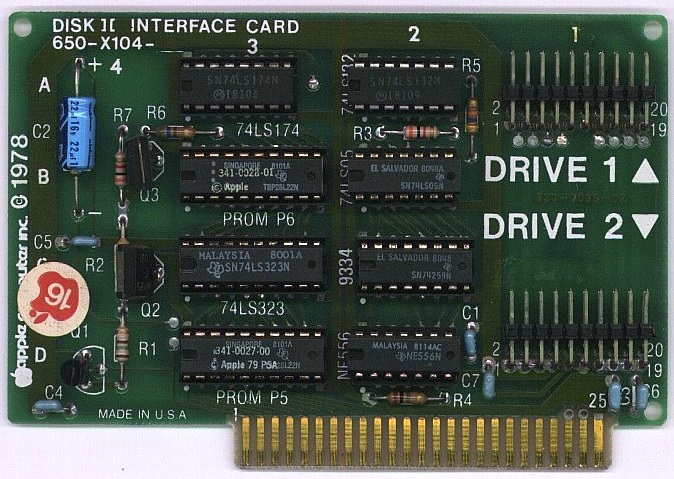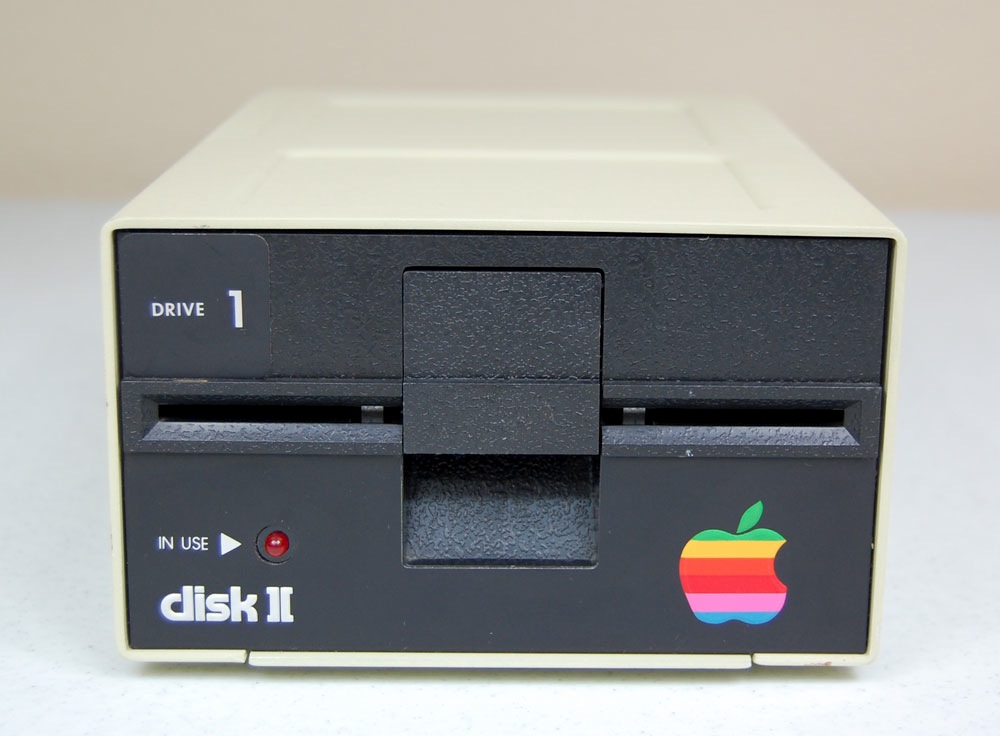Hi,
now I tried my Apple IIe again with ProDOS 3.3 and a Disk II drive. Strange behavior: After powering on with a beep, the disk drive starts chattering once (repositioning?), then spinning a while than chattering more (sounds bad) and afterwards beeping and prompting:
180A- A=00 X=00 Y=18 P=FF S=FC
#
Does someone know, what's wrong here? Short video: http://youtu.be/ziDHAfsZ8-8
Cheers
Blackswan


Is there a disk in the drive? If so, either the disk is bad, or something's wrong with the drive like a dirty head.
it sounded like it was loading. more likely the disk is bad or the drive speed needs adjustment. if you can't get _ANY_ disk to boot, drop a serial card into the box and load ADT, followed by Copy II+. Use Copy II+ to measure and adjust the drive speed.
As I'm now a proud owner of a functional A2M2010P (Apple II Monitor), I have to correct the error codes to:
1B0A- A=08 X=08 Y=1B P=FF S=FC
#
Unfortunately cleaning the head and adjusting drive speed didn't change anything. I've three boot disks (one of them should work). But I'm not sure, how to proceed due to the fact, that either the controller as well as the Disk II could be the issue. Can someone give me an example, how the Disk drive sounds, when a bootable disk is started, when a non-bootable disk is started and when a defective disk is started? Thank you so much.
My controller card (slot 6) is like:

My Disk II is like:

Blackswan
This one is a little exaggerated, but is representative:
http://www.youtube.com/watch?v=Dub4nraPLlQ
Do you have a serial card for this computer?
Sounds indeed grindy. But mine sounds too horrible, a liitle bit lie someone locked the head and it tries to reposition.
Yes, I do have a serial card, but honestly speaking, I don't know, which model it is:
Compared it with all the models on http://mirrors.apple2.org.za but found no match.
I will buy two audio cables today and try the ADT audio bootstrapping technique. Seems - from a preconfiguration perspective - the easiest way.
So, if this will work and I cannot write the transfered image to disk, then I still don't know, which part is faulty. Are there more possibilities, when I got (Pro)DOS running? Tools? Analyzers?
Blackswan
selftest passes, right?
It seems to be a clone of the Apple SSC.
I started ADT with audio transfer. ProDOS started without problems. Everything went well until ADTpro tried to format: the list was empty, no drives present.
After discovering the selftest hotkeys, my Apple IIe says:
RAM: F13 F12 F11 F10 F9 F8 F7 F6 :~
Did the drive do any chugging of any sort when ADTPro started?
Bummer... you've got some bad RAM:
http://support.apple.com/kb/TA38047?viewlocale=en_US
Also of interest:
http://www.applefritter.com/content/apple-iie-failing-ram-test
never seen it fail that way before; seems that every single RAM chip on the logic board is bad (in some way.) I hope for your sake, that those RAM chips are socketed.
Mmmhh... very strange, so why can ProDOS come up and run, when it is transfered via audio cable (ADTpro)? Wouldn't make sense, if every chip is bad. Because there is no 80-column card inside. So RAM size would be zero.
On the photo you can see, that most of the RAM chips are MT4264-20. Only the chip on column 6 is a Fujitsu MB8264-20 (in a socket). Seems like this chip has been changed already. Should I replace all the chips with new ones (in sockets)?
I wish you all a merry christmas,
Blackswan
Replace just the one socketed with a KNOWN GOOD CHIP, see if self test still identify that chip as being bad. I've never seen a board that identify all the ram as bad, and fear it might be some other problem.
I ordered some old RAM chips at the Bay (MB8264-15). I will desolder all RAM chips and insert sockets instead to test, which RAM chips are broken and which are not.
This machine is a real challenge...
Blackswan,
You just have to remember the old adage:
"What Apple II troubleshooting doesn't kill you, makes you stronger."
Steven
Hi,
From looking at the disk controller card, your chips look like they are oxidized. It can look like a black moss growing on the legs of the chips. The legs on the some of the socketed ones from the picture are turning black. Remove them one at a time, note where pin is before removing so you know where the notch is when putting them back in. It appears they all go the same way. This may happen with chips on the Analog board and some of the chips in the Apple II.
To clean the chips. A bottle of Tarn-X jewelry cleaner. Tarn-X does not hurt gold or sliver. An old (clean) tooth brush, some shot glasses , some Isopropyl Alcohol. Fill one of the shot glasses about 1/2 full of Tran-X then dip/drop the chip in it. In about 10-40 seconds pull it out and see if the black legs are gone. If they are have a second shot glass half full of the Alcohol. Drop the chip in there. Have a third and forth shot glass half full of it too. move the chip to the last glass. Use the tooth brush, on the chip then dip/drop it in. Now pull it out and let it dry. Repeat this process for the other chips. But after the 3rd or 4th chip cleaning throw out the Alcohol out of the first shot glass that has it. Shot glass #3 now becomes #2, actually it become the #1 shot half full of alcohol. Now the shot glass with the alcohol that got most of the Tarn-X off the chip was deposed of, get refilled it now goes to the end of the line. The Tarn-X does not have to be thrown out. Once the chips are dry they can be replaced. The multiple baths of alcohol should remove the Tarn-X and should dry quickly. Edge connectors of the card could cleaned too.
I do not know what could happen if some of the legs on the chip made a connection and some did not do to oxidation. But I do know with oxidation more heat is generated do to higher and higher resistance, until the heat (higher volts/amps) causes it to fail.
BTW are you the one that one the Logic Spiders on Ebay?
Take Care
I'm just sharing my related Apple IIe troubleshooting experience.
I was seeing the memory test (hold down the apple keys during power-up) fail with this message:
RAM: F13 F12 F11 F10 F9 F8 F7 F6
The symptoms were that the machine would not boot any of the disk-based software. It couldn't even boot DOS 3.3 - just crashed to monitor.
It turned out that replacing JUST ONE of the memory chips fixed the problem.